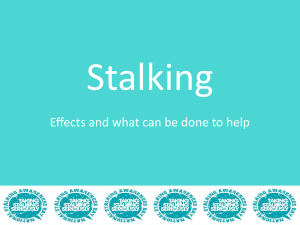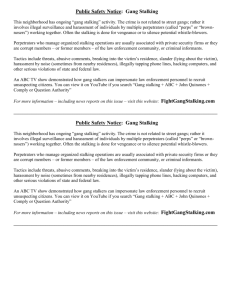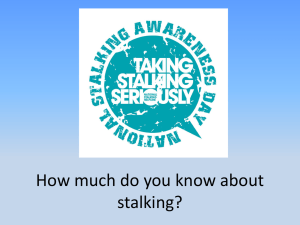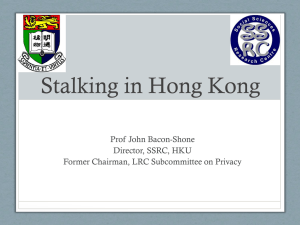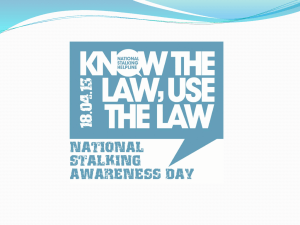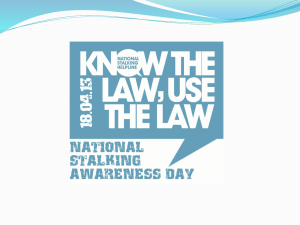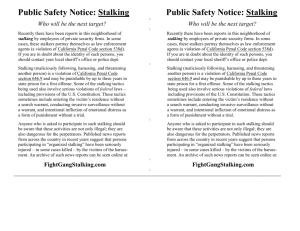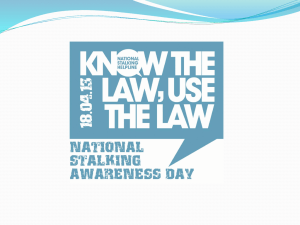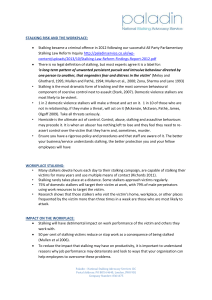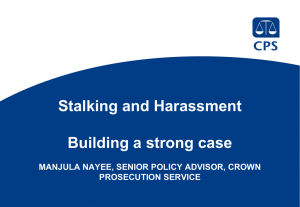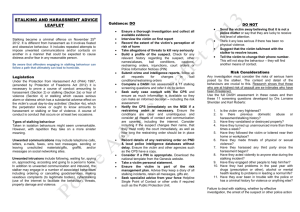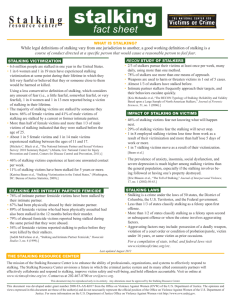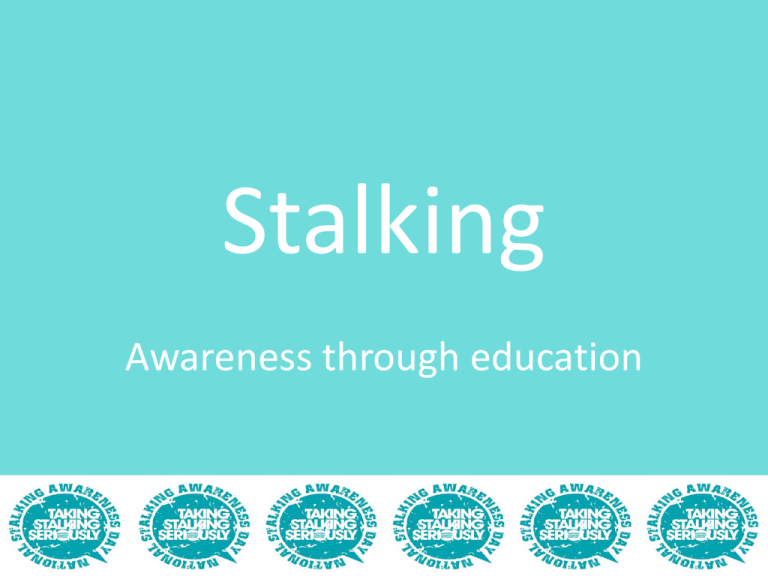
Stalking
Awareness through education
By the end of the show you
will...
• Be confident that you know exactly what
stalking is
• Be knowledgeable of the key statistics
surrounding stalking
• Be aware of the legislation which is used to
protect against it (UK)
So what is stalking?
•
•
•
•
•
•
Hunting?
A joke?
Not serious?
Flattering?
Nothing dangerous?
Something to be ignored?
No. Take Stalking Seriously
• Stalking can ultimately lead to murder. (76% of
women murdered by their ex partner were stalked in
the lead up to their death (McFarlane et al))
• The very nature of stalking means it is not a one off
event, the victim can suffer for years
• The stalker will often involve on average 21 people to
try to get to their victim (Sheridan 2009)
• For the effects of stalking please see the
accompanying PowerPoint
A definition
• It is hard to give a definition to stalking, stalkers often use
multiple and varying methods to harass their victim.
• Mullen (1999) describes stalking as ‘ a constellation of
behaviour’s in which an individual inflicts upon another
repeated unwanted intrusions and communications’.
Intrusions include making approaches, maintaining
surveillance and gathering information.
Definition cont..
• Communication and stalking behaviour can
include:
• Calls, texts, letters, cards, emails, internet
harassment, faxes, graffiti, gifts, ordering
goods and services on the victim's behalf,
hacking computers and phones, following and
criminal damage. Stalkers will find many ways
to harass and this list is not exhaustive
Who stalks?
• Anyone can be a stalker. However data from
the National Stalking Helpline shows that:
• 67% are male
• 38% are ex intimates
• 21% are acquaintance’s
• 9.5% are strangers
Who are the victims of stalking
• Anyone can be stalked
• 1 in 5 stalking victims are male
• Same sex stalking happens
• Certain professionals such as teachers and
nurses can be vulnerable to stalking
• There are also a number of secondary victims
The Law and stalking
•
•
•
•
England and Wales
Scotland
Northern Ireland
Possible Civil routes
• A Home Office consultation reviewing stalking
and its legislation recently closed (5th Feb). Try to
make sure you keep an eye out for any changes
England and Wales
• In E&W stalking behaviour is dealt with under the Protection from
Harassment Act of 1997
• This Act states that it is unlawful for a person to pursue a course of
conduct which they know or ought to know amounts to harassment
• A course of conduct is classed as two or more incidents which cause
alarm, distress or fear of violence
• The full legislation is available at:
http://www.legislation.gov.uk/ukpga/1997/40/contents
Scotland
• In Scotland Stalking comes under the Criminal Justice
and Licensing Act of 2010
• Stalking is an offence under section 39 of this act. If a
defendant is acquitted under this section they can be
found guilty under section 38
• The full legislation is available at:
http://www.legislation.gov.uk/asp/2010/13/contents
Northern Ireland
• In Northern Ireland stalking is dealt with
under the Protection from Harassment Order
1997
• This Act is almost identical to the PHA of E&W.
• It can be viewed at:
http://www.legislation.gov.uk/nisi/1997/1180
/contents/made
Civil Routes
• Some people may not wish to go to the police
• If this is the case it may be possible for the victim to seek legal
advice and perhaps get a form of injunction put in place to try
and protect them
• If an injunction is breached the perpetrator can be arrested
• The difficulties some find with this is that unless they are
entitled to legal aid there will be costs that apply
For more information you can
• Check out the National Stalking Helpline’s
website at: http://www.stalkinghelpline.org/
• Email us at- info@stalkinghelpline.org
• Ring us on 0808 802 0300
• You may also find it useful to visit Network for
Surviving Stalking, Protection Against Stalking
and Suzy Lamplugh Trust websites
Websites
• http://www.suzylamplugh.org/
• http://www.protectionagainststalking.org/
• http://www.nss.org.uk/
References
• National Stalking Helpline Statistics 2012
• Pathe, M (2002) Surviving Stalking. Cambridge University
Press, Cambridge.
• Mullen, P et al (2009) Stalkers and their Victims: Second
Edition. Cambridge University Press, Cambridge
• McFarlane et al
http://hsx.sagepub.com/content/3/4/300.abstract
• Sheridan, L. (2009)
http://www.le.ac.uk/press/stalkingsurvey.htm

